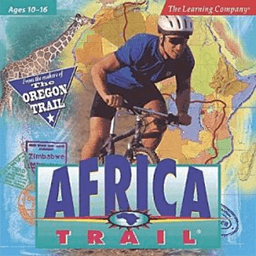Africa Trail facts for kids
Quick facts for kids Africa Trail |
|
|---|---|

Cover art
|
|
| Developer(s) | MECC |
| Publisher(s) | The Learning Company |
| Designer(s) | Cherie Neima |
| Platform(s) | MacOS, Windows, Windows 3.x |
| Release date(s) | 1995 |
| Genre(s) | Adventure, Educational, Simulation, Sports |
| Mode(s) | Single-Player |
Get ready for an amazing adventure across Africa! Africa Trail is a fun computer game where you travel by bicycle. It was made by MECC and published by The Learning Company. Just like other "Trail" games, you'll plan a big journey. You pick your friends for the trip. Your goal is to reach your destination safely. In Africa Trail, you'll cycle all the way across the continent! The game even helps you create a journal or presentation about your journey.
Contents
Starting Your African Bicycle Adventure
The main goal of Africa Trail is to reach Cape Agulhas, South Africa. You need to get there within a certain number of days.
Choosing Your Route
First, you pick your starting point and route.
- You can choose a longer journey from Bizerte, Tunisia.
- Or, you can pick two shorter routes. These start from Lagos, Nigeria or Nairobi, Kenya.
Picking Your Team
Next, you'll choose three teammates from six possible people. Each teammate has different skills. They vary in their job, biking experience, and travel experience. Some teammates will make your journey easier. They can help you reach your final destination on time.
Getting Ready to Go
Your team starts with a bicycle for everyone. You also get basic supplies and some money. You'll use this money to buy food, extra supplies, and places to stay. Don't forget to buy spare parts for your bikes! You can carry up to 300 pounds of items. Make sure you pack smart!
Exploring the Trail
As you travel, you'll face different challenges. You'll need to manage your supplies and keep your team healthy.
Crossing Borders and Talking to Locals
Before you enter a new country, you need special stamps called visas. You can get these in large cities or capital cities. If you don't have a visa, you'll have to go back! Visas cost money and take a few days to get. Talking to people in different countries depends on your teammates' language skills.
Managing Food and Supplies
Your bike team needs to eat and rest often.
- Food: You can buy groceries, which are cheaper and last longer. But they don't fill you up as much. Or you can buy meals, which are more nourishing. But they spoil quickly and cost more.
- Bike Parts: You'll need to buy extra bike parts for repairs.
- Rest: You can find places to stay, called lodgings, where your team can rest. Prices for everything change depending on where you are. They also depend on the money you use. You can buy things directly, try to bargain for a better price, or use a credit card. Remember, everything you buy adds weight! Your team can't carry more than the maximum weight.
Keeping Your Team Healthy and Happy
Your team's journey depends on their health and morale. You, as the player, don't have a morale level.
- Health: A teammate's health goes down if they get hurt. It also drops if they get sick or don't eat enough. If a teammate's health runs out, they can't continue the journey.
- Morale: Morale goes down if a teammate doesn't like your decisions. They might lose hope of finishing the trip. If morale runs out, that teammate will leave your team.
Learning While You Play
Africa Trail is designed to be fun and educational.
What You'll Learn
The game teaches you about many different things:
- Cultures: You'll see the many different cultures across Africa.
- Geography: You'll learn about different travel routes and places.
- History: You'll discover interesting facts about the continent's past.
- People: You'll learn about the diverse people who live there.
- Skills: The game also teaches you important life skills. You'll learn how to make careful decisions. You'll also learn how to manage your resources wisely.
 | Anna J. Cooper |
 | Mary McLeod Bethune |
 | Lillie Mae Bradford |

